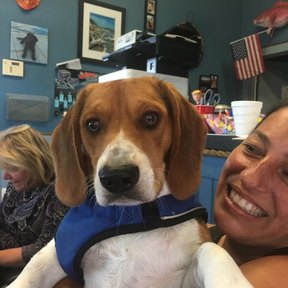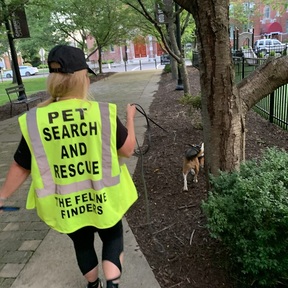-
Terry Lloyd
- Energetic Spiral Up - Animal Communicator - Nationwide
-
 PREMIUM
PRO
PREMIUM
PRO
 PETWORKS
PICK
PETWORKS
PICK
 INSTANT
CHECKOUT
INSTANT
CHECKOUT
 RAPID
RESPONDER
RAPID
RESPONDER
- Bolton, CT - I am a master energy healer certified in several modalities. I connect with the animal's higher self and communicate telepathically with them. When working with a sick...
-
(14 reviews)
-
- Certified
- Online Sessions
- Book Now
-
Ruth Hagen
- The Soulful Pet - Animal Communicator - Nationwide
-
 PREMIUM
PRO
PREMIUM
PRO
 INSTANT
CHECKOUT
INSTANT
CHECKOUT
 RAPID
RESPONDER
RAPID
RESPONDER
- Sonoma County, CA - Hi! I’m Ruth, a pet behavior consultant and animal intuitive with over 25 years of experience dedicated to improving the lives of cats, dogs, and their...
-
-
- Online Sessions
- Book Now
-
Lina Chero
- Lina Chero Animal Communication and Energy Healing - Nationwide
-
 PETWORKS
PICK
PETWORKS
PICK
 INSTANT
CHECKOUT
INSTANT
CHECKOUT
 RAPID
RESPONDER
RAPID
RESPONDER
- Bucks County, PA - As a certified Animal Communicator, Emotional Freedom Technique (EFT) practitioner, and Pranic Healing expert, I blend my diverse expertise to help animal companions and their guardians...
-
(1 review)
-
- Certified
- Online Sessions
- Book Now
-
Cathy Handford
- Cathy Handford - Animal Communication and Healing - Nationwide
-
 PREMIUM
PRO
PREMIUM
PRO
 PETWORKS
PICK
PETWORKS
PICK
 INSTANT
CHECKOUT
INSTANT
CHECKOUT
 RAPID
RESPONDER
RAPID
RESPONDER
- Fredericksburg, VA - Compassionate • Accurate • Healing for Animals and Their People As featured on AP News • CBS 42 ✨ About Cathy Whether your pet is anxious, grieving,...
-
(17 reviews)
-
- Certified
- Insured
- Online Sessions
- Book Now
-
Jessica Jocelyn
- Animal Communicator - Pet Intuitive Energy Healer - Nationwide
-
 INSTANT
CHECKOUT
INSTANT
CHECKOUT
 RAPID
RESPONDER
RAPID
RESPONDER
- Houston, TX - Hello, I’m Jessica, your go-to angel channeler and intuitive energy healer with a passion for connecting with pets! Since 2019, I have dedicated my career to helping...
-
-
- Online Sessions
- Book Now
-
Lindsey Latham
- Lost Pet Location Protocol™ — Nationwide & Worldwide - Nationwide
-
 PREMIUM
PRO
PREMIUM
PRO
 PETWORKS
PICK
PETWORKS
PICK
 INSTANT
CHECKOUT
INSTANT
CHECKOUT
 RAPID
RESPONDER
RAPID
RESPONDER
- Asheville, NC - Lost Pet Location Protocol™ — Nationwide & Worldwide If your pet is missing and you need guidance beyond flyers, shelters, and social media, this service provides focused...
-
(30 reviews)
-
- Certified
- Online Sessions
- Book Now
-
Teri Ann Tate
- Whisperer of the Animals - Animal Communicator - Nationwide
-
 PREMIUM
PRO
PREMIUM
PRO
 INSTANT
CHECKOUT
INSTANT
CHECKOUT
- Phoenix, AZ - Whisperer of the Animals offers so much more than just Animal Communication. Teri Ann is a Certified Animal Energy Practitioner, a Certified Trauma-Informed Horse Trainer and has...
-
-
- Certified
- Insured
- Online Sessions
- Book Now
-
Sahar Eva
- Eva Moheban, LCSW - Animal Communicator and Pet Intuitive - Nationwide
-
 INSTANT
CHECKOUT
INSTANT
CHECKOUT
- Thousand Oaks, CA - Hello! I have over 10 years of direct clinical experience as a trauma-informed, licensed clinical social worker (LCSW). I am certified in animal communication and have...
-
-
- Insured
- Online Sessions
- Book Now
-
Cris Pryce
- Remote Viewer - Depth Clairvoyance For Lost Pets - Nationwide
-
 PREMIUM
PRO
PREMIUM
PRO
 PETWORKS
PICK
PETWORKS
PICK
 INSTANT
CHECKOUT
INSTANT
CHECKOUT
 RAPID
RESPONDER
RAPID
RESPONDER
- Marshfield, VT - Finding pets worldwide, remotely, using remote viewing skills and depth clairvoyance. I am a proven. professionally trained remote viewer, trained by the best RV teachers in the...
-
(9 reviews)
-
- Certified
- Online Sessions
- Book Now
-
Nita Gomez
- Last Chance Locators | Lost Pet Recovery Specialists - Nationwide
-
 PETWORKS
PICK
PETWORKS
PICK
 INSTANT
CHECKOUT
INSTANT
CHECKOUT
 RAPID
RESPONDER
RAPID
RESPONDER
- , - Welcome to our Petworks listing: You will be working with Nita Like many of our clients, I ( my friends) have also experinced losing a pet. We were...
-
(31 reviews)
-
- Book Now
-
Dina Gaebel
- Soul To Soul With Dina -All Animal Communications - Nationwide
-
 PETWORKS
PICK
PETWORKS
PICK
 INSTANT
CHECKOUT
INSTANT
CHECKOUT
 RAPID
RESPONDER
RAPID
RESPONDER
- St. Augustine, FL - Animal Communication Living or Crossed Over. Misbehaving pets. Find out if they are in pain. Ask any questions. End of life Communication and Grieving the Loss...
-
(67 reviews)
-
- Certified
- Online Sessions
- Book Now
-
Jennifer Luciana
- Animal Communicator - Psychic Medium - Nationwide
-
 PETWORKS
PICK
PETWORKS
PICK
 INSTANT
CHECKOUT
INSTANT
CHECKOUT
 RAPID
RESPONDER
RAPID
RESPONDER
- White Plains, NY - I am very fortunate to be able to connect with any animal energy, both living and passed, to communicate their thoughts, feelings and emotions. My intention...
-
(50 reviews)
-
- Certified
- Insured
- Online Sessions
- Book Now
-
Annalisa Berns
- Pet Search and Rescue - Lost Pet Recovery Services - Nationwide
-
 PETWORKS
PICK
PETWORKS
PICK
 INSTANT
CHECKOUT
INSTANT
CHECKOUT
- Tampa, FL - LOST PET RECOVERY SERVICES - WE HELP FIND LOST PETS FLORIDA In-Person Searches NOT AVAILABLE in June and July due to the heat. Trained K-9 Search Dogs...
-
-
- Licensed
- Certified
- Online Sessions
- Book Now
-
Tim Link
- Tim Link of Wagging Tales - Animal Communicator - Nationwide
-
 PETWORKS
PICK
PETWORKS
PICK
 INSTANT
CHECKOUT
INSTANT
CHECKOUT
- Cumming, GA - Tim Link is an internationally recognized full-time animal communicator, a master Reiki energy healer for animals, author of Wagging Tales: Every Animal Has a Tale and Talking...
-
(8 reviews)
-
- Certified
- Bonded
- Insured
- Online Sessions
- Book Now
-
Kimberly Kerr
- Animal Communication & Energy Healing - Nationwide
-
 PETWORKS
PICK
PETWORKS
PICK
 INSTANT
CHECKOUT
INSTANT
CHECKOUT
 RAPID
RESPONDER
RAPID
RESPONDER
- Newberry, FL - Experience a deeper connection with your pets through animal communication. I bring nearly 10 years of experience learning and working with animals, energy, and healing. Communication with...
-
(6 reviews)
-
- Online Sessions
- Book Now
-
Lisa Willems
- The Feline Finders - Lost Cat Recovery Specialist - Nationwide
-
 PETWORKS
PICK
PETWORKS
PICK
 INSTANT
CHECKOUT
INSTANT
CHECKOUT
 RAPID
RESPONDER
RAPID
RESPONDER
- Little Rock, AR - I'm a certified Missing Animal Response Technician and Pet Detective. I am certified through the Missing Animal Response organization and Missing Animal Response Network. I specialize...
-
(3 reviews)
-
- Licensed
- Certified
- Book Now
featured cities
- Missing Pet Albuquerque
- Missing Pet Atlanta
- Missing Pet Austin
- Missing Pet Baltimore
- Missing Pet Boston
- Missing Pet Charlotte
- Missing Pet Chicago
- Missing Pet Cleveland
- Missing Pet Colorado Springs
- Missing Pet Columbus
- Missing Pet Dallas
- Missing Pet Denver
- Missing Pet Detroit
- Missing Pet El Paso
- Missing Pet Fort Worth
- Missing Pet Fresno
- Missing Pet Houston
- Missing Pet Indianapolis
- Missing Pet Jacksonville
- Missing Pet Kansas City
- Missing Pet Las Vegas
- Missing Pet Los Angeles
- Missing Pet Louisville
- Missing Pet Memphis
related articles
more info
Hiring a missing pet finder can be a critical step in locating a lost dog or cat. Here’s a breakdown of the costs, the process of hiring one, and key considerations for pet parents.
Cost of Hiring a Missing Pet Finder
The cost of hiring a missing pet finder varies depending on several factors:
Hourly Rates: Most pet finders charge an hourly rate, which can range from $50 to $150 per hour. The total cost will depend on how many hours the search takes.
Flat Fees: Some pet finders offer flat-rate packages, which can range from $200 to $1,500 or more, depending on the services included, such as consultations, search time, and specialized equipment.
Additional Costs: Extra charges may apply for the use of drones, scent-tracking dogs, thermal imaging, or extensive social media campaigns. Travel expenses may also be added if the finder needs to travel a significant distance.
Contingency Fees: In rare cases, a pet finder may offer a contingency-based fee, where a portion of the fee is payable only if the pet is found. This can provide some financial security but is less commonly available.
How to Hire a Missing Pet Finder
The process of hiring a missing pet finder typically involves the following steps:
Research and Referrals: Start by going to Petworks, and then researching pet finders in your area. Look for professionals with positive reviews and testimonials. Asking for referrals from local veterinarians, shelters, or pet rescue groups can also be helpful.
Initial Consultation: Most pet finders will offer an initial consultation to discuss the details of the case. During this consultation, they will ask about the pet's behavior, the circumstances of the loss, and any previous search efforts. This helps them determine the best approach.
Requesting a Quote: After the consultation, the pet finder will typically provide a quote that outlines the costs involved. Make sure to get a detailed breakdown of what’s included in the price.
Reviewing Credentials: Verify the pet finder’s experience, success rate, and any certifications they may hold. It’s important to ensure they have the skills and tools necessary for your specific situation.
Agreement and Payment: Once you’re satisfied with the terms, you’ll sign an agreement and make the necessary payments, which may include an upfront fee.
Key Considerations When Starting the Process
When beginning the process of finding a lost pet, pet parents should keep the following considerations in mind:
Time Sensitivity: The sooner you can begin the search, the better. Early action increases the chances of finding your pet, especially if they have wandered far or are in a vulnerable state.
Thorough Information: Provide the pet finder with as much detailed information as possible, including recent photos, any identifiable markings, the pet’s typical behavior, and the circumstances of the loss.
Community Involvement: In addition to hiring a professional, engage your local community by posting flyers, using social media, and contacting local shelters and veterinarians. Community involvement can significantly increase the chances of locating your pet.
Realistic Expectations: While pet finders are skilled, they cannot guarantee success. Understanding the challenges and maintaining realistic expectations can help you navigate the process more effectively.
Legal and Safety Considerations: Ensure that any methods used by the pet finder are legal and safe. Avoid finders who suggest unethical practices or methods that could put your pet or others at risk.
Emotional Preparedness: The search for a lost pet can be emotionally taxing. Prepare yourself for the process and consider seeking support from friends, family, or pet loss support groups during this time.
By understanding the costs, knowing how to hire a qualified professional, and considering these key factors, pet parents can take informed steps to increase the chances of finding their lost dog or cat.
To become a professional missing pet finder, start by gaining knowledge in animal behavior and search techniques. Pursue relevant certifications, such as pet detective training programs. Acquire tools like scent-tracking dogs, GPS devices, and social media skills. Build experience by volunteering with animal rescue organizations and participating in local searches. Develop strong communication and problem-solving abilities. Network with other professionals in the field and establish a reputable business by showcasing your success in reuniting lost pets with their parents.
You may also consider booking these pet care services:
Missing Pet by State





















